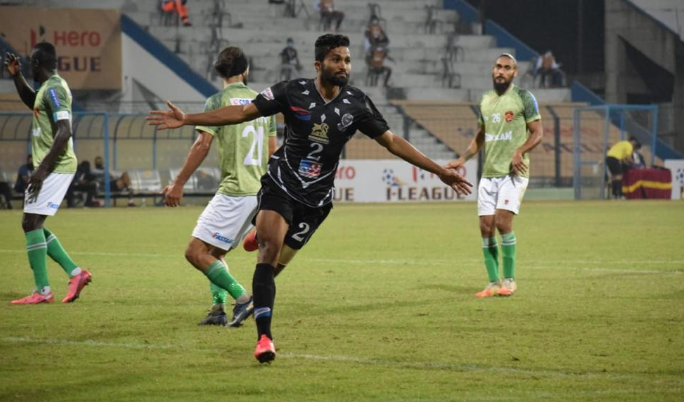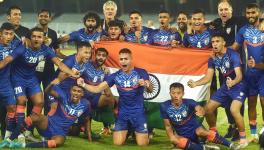Kamptee, Kashmir and Kolkata: Asheer Akhtar Examines Indian Football

Asheer Akhtar celebrates a strike for Mohammedan Sporting Club in the I-League.
On the day of his Accounts exam in his first year of college, Asheer Akhtar was on a football pitch training, despite having told everyone he wouldn’t be there. It wasn’t a last minute call, it was one made after a lot of deliberation — confirmed after a conversation with his father the night prior.
“I sat my family down and told them I wasn’t going to sit for the paper,” he recalls. “I was clear. I’d never failed at anything before in my life. And I didn’t want to fail for the first time then.”
It is a standard Mexican standoff story. Sport vs studies. This is the Pulp Fiction diner scene of Indian sport. The problem isn’t in picking the winner, it is in the winnings itself.
Asheer grew up in Kamptee, a suburb outside of Nagpur, the youngest of four siblings. His father was a footballer who played for the local team — Rabbani FC. As a kid Asheer would accompany him to the ground. He took to the game and gradually rose up the ranks going on in fact to get selected for the Under-13 India camp for the Asian Under-13 Football Festival.
Also Read | What NEROCA FC’s Relegation From I-League Means for Indian Football’s Supply Chain
“It stands to reason that I wasn’t picked for the final squad. My basics weren’t very clear, I’d learnt everything by myself, not at an academy and all….”
Asheer was good at school through his childhood — a fact that comes up frequently, almost to reaffirm that football wasn’t the only option, it was the preferred one — and averaged in the 90th percentile right till Class X.
“But I was very clear about becoming a footballer,” he says. “And I mean professionally. I’d say this in class and my teachers would tell me to reconsider.”
“Padhai continue karo (continue your studies), they would say. Kamptee has never had any big professionals. At least not in recent times. For most players the objective was to play the Santosh Trophy, use it to get a job and secure your life. But for me that wasn’t enough. I wanted to go pro.”
As a first step towards that ambition, he shifted to SAIL Bokaro for Class X. “It was a much debated decision to move away from home,” he says. “People around us didn’t understand why I was doing it. My elder sisters were also sceptical of me pursuing professional football. But I’d consulted my father and I decided to go anyway.”
Also Read | Mumbai City FC Beat ATK Mohun Bagan Again in Final, Lift ISL Cup
Those years in Bokaro were tough on the young boy. It took him time to settle in and understand the ways of an academy system. He was there for two years — in which he even represented them at the Subroto Cup — but throughout he was left with one standard niggling doubt.
“Mujhe aagey ka kuch clear dikh nahi raha tha (I did not have a clear vision about the future),” he says. “I learnt a lot. Cleaned up my technique but I didn’t see a way ahead for me in football.”
Asheer’s experience is not singular in nature. Indian football’s academy and grassroots system often leaves players in a deep state of indecision. It doesn't exactly prepare them for professional football, but, more importantly, it fails to console them or tell them there is a full life outside of it.
Asheer returned home. He decided he would finish Class XII, finish graduation and take up a job. “I’d planned it out in my head,” he says, “because football wasn’t making sense”.
There is a traditional North Indian phrase used for a thought or idea that refuses to go away. Bhoot savaar hai. The simple English translation (possessed) doesn’t do justice to what it actually means. Quite literally the phrase is more visceral and visual. And in Asheer’s case perhaps more applicable too.
He came back to Kamptee with a footballing Betaal hanging on his back. His friends had moved on ahead of him — in class as well as otherwise — and his family didn’t understand why he’d quit. How could they understand? Those within the game often enough don’t understand why they lumber on. Quitting is unnatural. It is a failure of the mind. But continuing on is sometimes even worse. It kills the spirit.
“I went back to Rabbani Club, just to keep playing my football,” Asheer says. He was searching for a reason to love the game again. At the time the Nagpur Premier League held auctions, and despite having been out of the scene for so long Asheer ended up becoming one of the most expensive buys of the season. He was also the youngest. Rabbani Club won the league and Asheer excelled. Former India international Ishrat Kamal noticed his talent and called him aside to introduce him to a man who would end up shaping his football career irrevocably.
“I don’t know what Ishrat bhai thought. Maybe unhone kuch dekha. He introduced me to Naushad Moosa. They had played together at Air India. Moosa sir sent me to Pune FC for a trial and I got in...”
Also Read | Power Shift, What Power Shift? This is Just a Casual Venue Shift
It seemed like finally, after several swings of the pendulum, many moments of indecision, the narrative would settle down. You can understand why when that accounting exam came up he went all in. It was poker with a straight face. He didn’t want to fail for the first time in his life. Not like this. Not when there was no need to.
Pune were a solid team filled with players who are now common names in Indian football. The likes of Ashique Kuruniyan, Farukh Chaudhary, Myron Mendes and Altamash Syed. A solid professional team that had a good youth system and churned out players galore. And then they shut shop. “It was right before preseason. I was literally at the station, getting on a train to go back to Pune, when I heard the club had shut down,” Asheer recalls. Indian football’s omnipresent Betaal, economic insecurity, had taken control of the story.
“I was left with no options,” Asheer says. It’s not about whether you get knocked down. It’s about getting up. Finding something where no options there are some that exist. He went to Lonestar Kashmir, an experience he calls surreal. It was strange weather, and he went there when the state was ravaged by earthquakes. But the crowds and the beauty kept him there. He admits it wasn’t a great season but he got some much needed game time. Enough to keep him in thrall. He ended up playing in the Santosh Trophy for them. Another surreal experience because the tournament was held in Nagpur (“We played Maharashtra in the opener. It was really strange”).
His career took off. And yet somehow the nature of Indian football is such that he always ended up going to clubs that either shut down, downscaled or shifted gears. Stints at Salgaocar, BFC reserves and East Bengal (last season) came and ended with him playing in fits and starts.
Till he got to Mohammedan Sporting. It may not have been the greatest season for a club considered favourites but Asheer has had a solid time. When he has been on the pitch, Mohammedan, invariably have looked solid.
Also Read | Tackling Capital Apathy: Deepak Devrani Lays Bare the Delhi Football Conundrum
It is testament to how important his presence in the centre of defence is that when his team took a surprise lead against Churchill Brothers on Monday, a former BFC teammate quickly checked the team sheet (Asheer had been recovering from an injury he picked up earlier in the season), before confidently declaring Mohammedan would win the game.
“They scored and Asheer khel raha hai,” Gursimrat Gill said watching the game at dinner. “They’ll probably score more. But they won’t lose their heads.” They didn’t. They beat the league leaders and took the title race to another game week. After several debilitating results, they got back up.
Get the latest reports & analysis with people's perspective on Protests, movements & deep analytical videos, discussions of the current affairs in your Telegram app. Subscribe to NewsClick's Telegram channel & get Real-Time updates on stories, as they get published on our website.
























